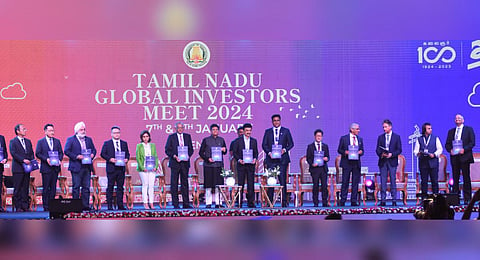

CHENNAI: The Tamil Nadu Semiconductor and Advanced Electronics Policy 2024 released by Chief Minister MK Stalin on Monday aims at contributing 40% of India’s electronics exports by 2030 and creating a skilled talent pool of two lakh people in this sector by 2030.
Incentivising strategic investments, nurturing talent and fostering collaborations across industry, academia, and government, attracting anchor investments in semiconductor and advanced electronics manufacturing, enabling a semiconductor design ecosystem in the state through incentives, funding and industry academia collaboration are the key objectives of this policy.
It aims at creating a state-of-the-art manufacturing and design ecosystem, particularly in the higher value-added segments in the semiconductor and advanced electronics industry, generating high-quality jobs.
The document said the aspiration of Tamil Nadu to foray into advanced electronics manufacturing encompassing design, component and equipment manufacturing and the strategic nature of the semiconductor industry necessitate a focused policy encouraging the entry of marquee players, which, in turn, meets the state’s aspiration to move up the value chain.
To nurture indigenous chip design players and add impetus to R&D in this sector, a futuristic policy is a need. A new policy shall also stimulate sectors such as aerospace & defence, medical devices, automobile & EV and renewable energy. The policy also pointed out that a highly skilled talent pool is available for the technical workforce required in shop floors, with about 1.13 lakh youth passing out from diploma and polytechnic institutions every year.
On infrastructure availability for semiconductor and electronics industry, the policy said the critical input required for semiconductor manufacturing is access to uninterrupted power supply. With an installed capacity of 38 GW and 50% of it being green power, Tamil Nadu has one of the most reliable power infrastructure systems with competitive tariff in India.
On incentives to semiconductor manufacturing units, the policy said eligible units will be offered a capital subsidy up to 50% of CAPEX assistance provided by the centre. For eligible projects in Sipcot estates, land allotment will be made at a 10% concessional rate in A & B districts and at a 50% concessional rate in C districts for land up to 20% of eligible fixed assets. An interest subvention of 5% as a rebate in the rate of interest shall be provided for actual term loans taken to finance the project.
A 100% stamp duty exemption will be given for lease or purchase of land/ shed/ buildings intended for industrial use on land obtained from Sipcot. For private land, a stamp duty concession will be provided as a 100% back-ended subsidy for up to 50 acres, contingent upon the fulfilment of investment and employment commitments. New or expansion projects will be given an electricity tax exemption for a period of five years on power purchased from Tangedco and/or generated and consumed from captive sources.